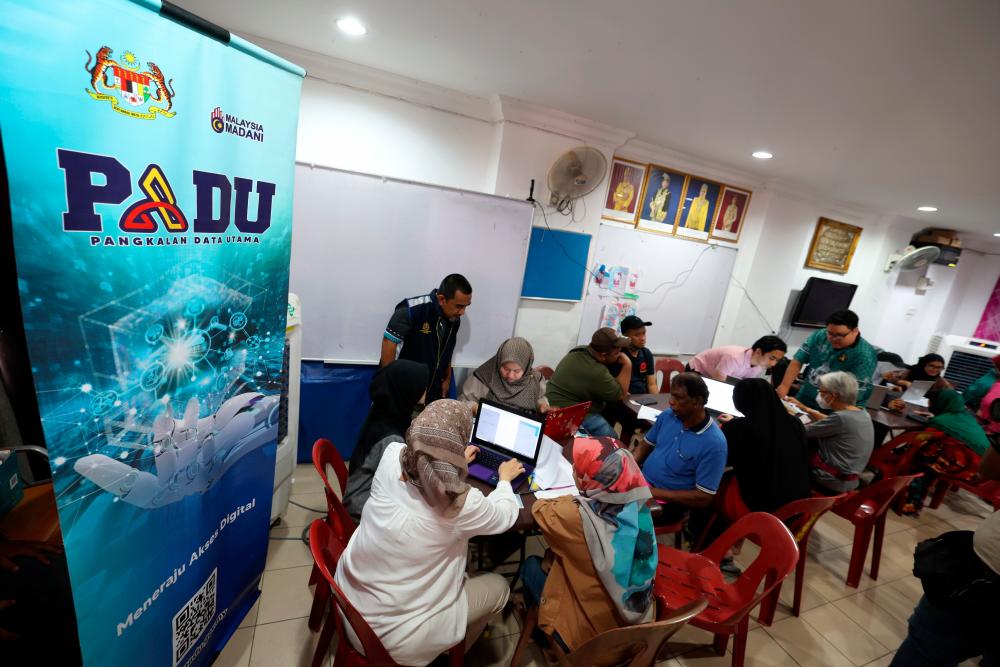PETALING JAYA: An impressive 10.85 million of the 30.08 million Malaysians who registered in the Central Database Hub (Padu) have updated their details as of yesterday.
Economist Dr Geoffrey Williams said this exceeds expectations and sets the stage for targeted subsidies and streamlined welfare distribution.
“Despite initial scepticism, the achievement has drawn praise from Economy Minister Rafizi Ramli, underscoring the success of efforts in expanding the reach of social assistance programmes.
“The significance of reaching the 10 million milestone cannot be overstated, as it represents a comprehensive identification of individuals eligible for targeted subsidies, transcending barriers that hindered previous welfare initiatives.”
By encompassing nearly half of the adult population within its ambit, Williams said Padu has effectively penetrated the socioeconomic strata, providing an understanding of income demographics that is crucial for tailored welfare interventions.
In the Padu database, sourced from its administrative data sources, there are 30.08 million citizens aged below one and above, of which 21.97 million are aged 18 and above.
“Malaysia has a 30.08 million population, with around 20 million eligible voters. The Padu registration target was set at 20 million, considering children registered under their parents.
“Surpassing the halfway point in registrations highlights the initiative’s success in reaching its target audience.”
Williams said the robust registration rate ensures a comprehensive database for welfare distribution and heralds a new era of data-driven policymaking.
“By harnessing precise income data from Padu, the authorities can calibrate subsidy thresholds and even contemplate initiatives such as universal basic income with unprecedented accuracy.
“This data-driven approach promises to minimise wastage, leakage and corruption that is inherent in traditional welfare distribution channels, and offers a direct lifeline to those in need,” Williams said.
Nusantara Academy for Strategic Research senior fellow Dr Azmi Hassan said the thoroughness of Padu registration positively facilitates the shaping of long-term policies and sheds light on income dynamics that were previously hidden by conventional data sources.
“With Padu serving as a cornerstone for targeted subsidies, the government can now pivot towards a more efficient and equitable welfare ecosystem, in which assistance is channelled directly to deserving recipients.
“By excluding affluent segments from welfare entitlement, resources can be reallocated towards uplifting the marginalised, ensuring that assistance reaches those who need it most.”
Azmi said there are still concerns among higher-income groups, who may have reservations regarding data privacy or the necessity of registration.
“However, Padu’s ability to surpass the halfway mark in registrations suggests that it has been successful in addressing these concerns and gaining the trust of a significant portion of the population, including those with higher incomes.”
Azmi said as Malaysia charts a course towards a more equitable society, the success of Padu registration stands as a testament to the transformative potential of data-driven governance.
“With a robust framework in place, the government is poised to embark on a journey towards targeted subsidies and inclusive welfare policies, laying the foundation for a more resilient and equitable future.”
Rafizi said Padu might reopen for those who missed the registration deadline yesterday.
However, he did not specify when this would happen, suggesting it could be towards the end of the year or in a few months, after implementing targeted subsidies.
“If we do not close Padu now, there will be no end and we cannot move toward targeted subsidies.”









